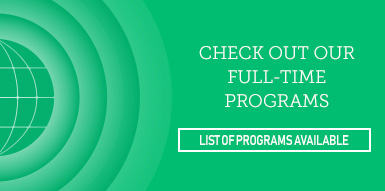-
Future Students
-
Admissions
Programs
Programs for Domestic Students
Courses
-
-
Current Students
-
Part Time
Student Logins
Student Logins
-
-
International Students
-
About Pace
-
About Pace
-
Flexible Workplaces: Threat or Opportunity?
Embracing flexible work models is a massive opportunity. Not a threat.

I’ve had conversations, as recently as the last few months, with leaders who’ve asked, ‘When do you think work is going to go back to normal?’ or ‘When is this remote / hybrid trend going to be done?’.
The answer is that work isn’t going back to pre-pandemic normal, and a changing work environment and flexible work is here to stay.
What is the future of work?
But when we think of the future of work, it involves so much more than just where people work, but also when they work.
In fact, the number one type of flexibility most people are looking for is flexibility with their schedule. It’s clear that most that people want to engage in work they can plan around their life. Instead of planning their life around their work.
These continuous changes in when, how, and where we work are an opportunity for a healthier workforce, increased employee engagement, enhanced ability to attract and retain top talent, and more creativity and innovation in most workplaces.
No one-size fits all
This evolution can seem overwhelming. But individuals and workplaces don’t have to embrace all these changes and trends at once. Different arrangements will work for different people and organizations. The evolving workplace won’t be a one size fits all approach.
It's okay if someone wants to work full-time onsite even if most others work remotely. It’s okay if an organization determines they can’t accommodate ‘work from anywhere’ options based on their business model. But each organization does need to consider what they can offer that is flexible and what will work for their business. Because the future of work is undoubtably flexible.
The future of work is flexible
Right now, talent is overwhelmingly looking for remote work options. If an organization is unwilling or unable to offer remote work, it will mean that they must find ways to provide equally alluring perks and flexibility to offset the impact of on-site only work. Organizations will need to become more deliberate in building their value proposition to employees.
Perhaps an organization can offer self-scheduling options for their customer service team, or they can offer core hours to corporate staff and allow their staff to work whenever works for them outside of that core 3-5 hour stretch each day. Perhaps location flexibility doesn’t work for your team, but you can consider a four-day work week or a 6-hour workday.
Key trends for the future of work in the coming year
- Continued focus on flexible work arrangements that work for employees and employers.
- Different teams and departments offering different options for work within the same organization (i.e., finance will have different requirements than the front-line customer service team).
- A shift from wellness to a focus on overall well-being (physical, mental, financial and community well-being).
- Expansion of non-traditional candidates in hiring processes (part-time, remote, offshore, contractors, etc.).
- Increased expectations of leaders who can experiment and lead flexible work arrangements and focus on well-being.
- Many organizations will continue to shift to digital and/or remote first.
- Flex work and hybrid innovation will reach front-line and production roles.
- Talent will look for roles that can meet their individual workstyle needs and may be willing to trade money for more time and flexibility in negotiation.
- The rise of the 30–32-hour work week (whether a 4-day work week or 6ish-hour workday).
Future-oriented organizations and leaders will be expected to experiment with how and when work gets done. And this process of experimentation will be on-going as workplaces continue to evolve to meet business needs and the needs of their workforce.
Find a new way of working
The standard 40-hour work week was developed over 100 years ago and was based on what worked best in an automotive manufacturing environment. In the knowledge era, it makes sense that a new and less rigid way of working has emerged.
This new way of working should allow organizations to continue to experiment with models of work and allow employees to experiment with what works best for them specifically. Individual work arrangements will be on the rise and will allow employees to negotiate for the specific arrangements that will allow them to thrive and do their best work.
Change brings opportunities
The world of work is changing rapidly. It can be challenging for workplaces and individuals to keep up. But big changes bring big opportunities. Don’t miss the opportunity to build a stronger, healthier, and more engaged workforce that will bring with it the opportunity for more innovation, creativity and even better business results.
About the Author: Jane Helbrecht
Jane Helbrecht is the founder of Uplift Engagement and a leadership development and people & culture expert with over 15 years of experience in training and HR roles. At Uplift, she focuses on building people and leadership development programs that shift team dynamics so that teams can focus, get stuff done and have fun while they do it.Jane holds a B.Comm (Hons) from the I.H. Asper School of Business at the Univerity of Manitoba with a double major in Human Resources Management and International Business. She also has her CPHR designation and is a Certified Leadership Coach.
Jane teaches the course: Embracing the Future of Workforce Flexibility at uWinnipeg PACE.
The short, 2-day course explores how employees can decide on their own meaningful work experiences and how organizations and leaders can raise the bar to meet those needs. By the end, participants will have the tools to help their organization embrace flexible workforce models.
Participants earn a digital badge for completing the course, and can stack it with two complementary courses, to earn the Mastering The Future of Workplace Management Microcredential.







